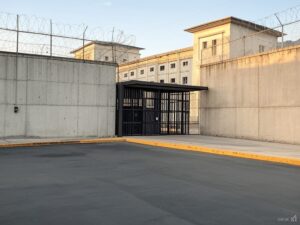Welcome to the blog of Georgia Criminal Attorney George Creal, where we delve into the intricacies of criminal law, share insights from the courtroom, and offer guidance on navigating the complexities of legal challenges in the Peach State. With a career spanning over three decades, Attorney Creal has become a beacon for those in need of robust defense, especially in DUI, criminal defense, and related legal matters. Here, we'll explore recent case studies, legal updates, and strategic advice to empower you or your loved ones when facing the justice system. Stay informed, stay prepared, with George Creal, your advocate in Georgia's legal arena.
It appears that in President Trump’s first few weeks he is play Go while his opponents are playing
The issue of housing American prisoners in foreign prisons, particularly in the context of those associated with designated terrorist organizations, involves complex legal, constitutional, and international considerations. While there's no direct U.S. Supreme Court case explicitly addressing this precise scenario, several principles and cases can inform the discussion:
1. Constitutional Concerns:
- 8th Amendment: The U.S. Constitution's Eighth Amendment prohibits "cruel and unusual punishments." Housing American citizens in foreign prisons known for harsh conditions might raise constitutional questions, especially if those conditions are deemed "cruel and unusual."
- 14th Amendment: This amendment ensures due process and equal protection under the law. Transferring U.S. citizens to serve their sentences abroad could potentially violate due process if it lacks proper legal procedure or if it's seen as discriminatory.
2. Relevant U.S. Supreme Court Cases:
- Zadvydas v. Davis, 533 U.S. 678 (2001): While this case primarily deals with the detention of immigrants, it established that indefinite detention could be unconstitutional if it becomes punitive rather than regulatory. This principle might be invoked if the transfer to another country's prison system is seen as punitive or if conditions there constitute punishment beyond what would be allowed in the U.S.
- Hamdi v. Rumsfeld, 542 U.S. 507(2004): This case involved an American citizen detained as an enemy combatant. The Supreme Court ruled that Hamdi was entitled to due process, which included the right to contest his detention before a neutral decision-maker. This could suggest that any American prisoner, even if linked to a terrorist organization, must have due process rights respected less than a jury trial and perhaps as limited as a habeas corpus hearing.
- Boumediene v. Bush 553 U.S. 723 (2008): Although this case dealt with the right to habeas corpus for foreign detainees at Guantanamo, it reaffirmed the importance of constitutional protections, but the opinion was limited to prisons on U.S. soil.
3. Legal and Practical Considerations:
- U.S. Law: Under current U.S. law, deporting U.S. citizens is generally not permissible unless their citizenship was obtained fraudulently. However, for non-citizens, the U.S. can negotiate with other countries for incarceration, but this has traditionally been for serving sentences in their home countries, not for transferring U.S. citizens to foreign prisons.
- International Agreements: Any such arrangement would likely require international agreements or treaties, which would need to ensure that the rights of the prisoners are protected to standards comparable to those in the U.S.
Given these considerations:
- No straight "yes" or "no" answer can be given to whether American prisoners can be housed in El Salvadoran prisons based solely on their association with a designated terrorist organization. However, based on the legal framework and Supreme Court precedents:
- It would likely face significant legal challenges concerning constitutional rights, due process, and the conditions of confinement in foreign prisons.
- Legislation or a new treaty would be needed to legally enable such transfers, with mechanisms in place to ensure compliance with U.S. constitutional standards.
The current discourse also highlights significant concerns from human rights perspectives and legal experts about the feasibility and legality of such a move. The Trump administration's contemplation of this proposal would indeed need to navigate these legal waters carefully, potentially setting new legal precedents or facing judicial scrutiny.
Contact Us Today
For a free consultation, contact the Law Offices of George Creal today on the web at www.georgecreal.com or on the phone at (404) 333-0706. We are here to help you navigate the legal system and fight for your rights.
Disclaimer
The information in this blog post is for general informational purposes only and should not be construed as legal advice. Please consult with an attorney to discuss your specific legal situation.

